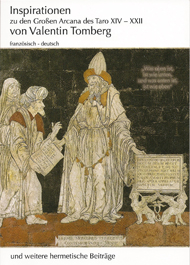 Die deutsche Version dieser Homepage finden Sie unter fhab.de Die deutsche Version dieser Homepage finden Sie unter fhab.de |
 |
|
Valentin Tomberg
In a letter of September1932 (see: Seiß, W. Der Kampf gegen Valentin Tomberg, Teil B, Briefwechsel [8], Schönach 1999; P. A 19.1) he asks of Marie Steiner to grant his wife Maria and himself a year’s stay in Dornach. He wanted to study at the archives there in order, under consideration of the contributions of Rudolf Steiner to the theme, to be able to complete a work about the peoples of the east. He intended to earn his own livelihood by giving lectures. Marie Steiner, however, turned the request down on the grounds that in Dornach no lecturer was needed.
From 1931 Tomberg gives lectures in Tallin about the Old Testament. Because of their esoteric depth these lectures become the cause of traducements against Tomberg in Dornach as well as the starting point of an ongoing strife concerning him. Tragically these incidents determined the comprehensive marginalization of Tomberg which continues to this day within anthroposophic circles. The lectures were written down by Tomberg and from November 1933 they are sent in 12 consignments to subscribers every few months, the last consignment being sent in 1935. They were followed from 1936 by the 12 Considerations on the New Testament as well as 3 further considerations on the Apocalypse. 12 considerations on the Apocalypse had been intended, but Tomberg stalls the consignments. Records or notations for further studies on the Apocalypse have to this day not been found.
As the work in Estonia cannot be continued due to the antagonism from Dornach Tomberg in 1939 leaves for Holland where some friends offer to provide support for him.
He thankfully accepts this offer and during the following Christmas conference in Rotterdam he lectures on “The four sacrifices of Christ and the appearance of Christ in the etheric”. Also these lectures are later published in bookform [9], as are also the lectures held in Rotterdam august 1938: “Seven lectures on the inner development of the human being” [10]. In Talin, Estonia, Tomberg produced his first two considerations on the Foundation Stone Meditation by Rudolf Steiner (in 1936 and 1937/38), which were augmented by a third contribution in Rotterdam in 1939 [11].
An end is put to the public anthroposophical work of Tomberg in Holland through the antagonism of Willem Zeylmans van Emmichoven, then General Secretary of the Anthroposophical Society in Holland. He declines Tombergs esoteric contributions, his karmic insights and his Christian orientation, all of which he finds impedimental, and he advises Tomberg to leave the Anthroposophical Society. Tomberg withdraws and with a few friends he holds the so-called Our Father Course on a weekly basis for more than 2 years from the outbreak of war in Holland in 1940. (The course is currently being published by ACHAMOTH Verlag). In this course Tomberg passes on his extensive knowledge and comprehension of Christian esotericism as he leads his friends into the depths of the Passion, the Beatitudes, the Wonders, the I Am sayings and the images of the Apocalypse at hand of the seven petitions of the Lords Prayer.
In 1944 Tomberg moves to Müllheim an der Ruhr, Germany, to his friends Ernst and Gertrud von Hippel. There he completes his studies of jurisprudence. Two works are published in this connection, his Dissertation, Degeneration und Regeneration der Rechtswissenschaft, [12] 1946 which is republished in 1974, and Die Grundlagen des Völkerrechts als Menschheitsrecht [13], Götz Schwippert Verlag, 1947 Köln. Tomberg is given the task to assist in the construction of the Volkshochschule (Peoples High School) in Müllheim.
------------------------------------------------
[8] The fight against Valentin Tomberg; Part B; Correspondence
[9] Die Vier Christusopfer und das Erscheinen des Christus im Ätherischen; Schönach, 3rd Edition 1994
[10] Sieben Vorträge über die innere Entwicklung des Menschen; Schönach, 2nd Edition 1993
[11] Die Grundsteinmeditation Rudolf Steiners; Schönach, 2nd Edition 1993
[12] Degeneration and regeneration of jurisprudence
[13] The foundations of laws of nations as human rights
- « first
- ‹ previous
- of 3
- next ›
- last »
